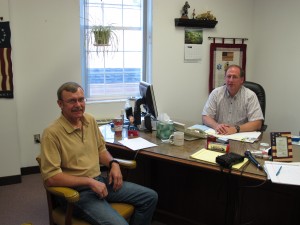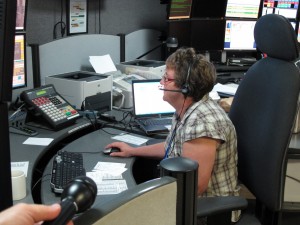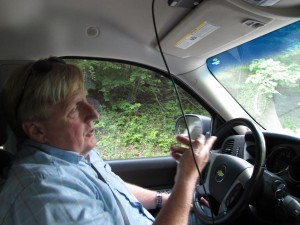Drilling Boom’s Strain on County Resources Leads to Calls for Impact Fee
Part Two of Two. (Yesterday, we told you how the number of 911 calls has gone up in seven of eight drilling-heavy counties. Today, a look at how officials are worried they’ll need to hike property taxes to keep up with increased demands.)
911 calls climbed by double digits in nearly all of the counties in Pennsylvania where gas drilling is the heaviest, a likely sign of the natural gas boom’s strain on public resources. But just as counties feel the pinch, the workers who respond to emergencies are leaving for higher-paying jobs with the drillers.
In Tioga County, incidents jumped 15 percent between 2009 and 2010, and are on pace for another 15 percent spike this year. County workers say they need to hire more dispatchers, and that requires more tax dollars. In Tioga County, it costs an estimated $15,000 to train a new employee. And teaching takes time. “It takes us six to nine months, on average, to train someone,” said Lisa Rice, who runs the county’s call center. “If that person doesn’t stay after six months, [we start] all over again with a $15,000 deficit.”
Ensuring new hires stay longer would likely mean increasing the positions’ salary. Again, more dollars the counties say they don’t have.
There are larger costs, too. “Not only am I looking at the need for more staff,” said Rice, “If we hire enough [new employees], I’m not going to be able to fit them into the room we’re using. That’s going to mean remodeling, or moving to a different part of the building.” Each dispatcher sits at a console with ten computer screens and multiple phone lines.
County Commissioner Mark Hamilton, a Republican, is worried he won’t be able to fund the needed expansion without a tax increase. The county already hiked its property taxes by one mil – an extra $100 for a $100,000 house — last year. “Hopefully we’re going to be OK this year,” he said, “but…if we have to put another position in, to the tune of whatever, $100,000, $200,000, and have to hire 3 or 4 more dispatchers – it’s obvious the gas industry has caused that, so why should they not pay their fair share?”
Hamilton, who serves as the president of the County Commissioners Association of Pennsylvania, supports an impact fee on gas drillers to help offset the cost of more resources. Currently, a dozen different tax or fee proposals are before the General Assembly. The most high-profile measure, introduced by Senate President Pro Tem Joe Scarnati and amended by the Senate Environmental Resources and Energy Committee, would charge a $40,000 per-well-levy on drillers, and distribute money to counties and municipalities that host drillers, as well as statewide environmental cleanup efforts.
Impact on Resources Reaches Wide

Scott Detrow / StateImpactPA
Denny Colgrove (left) and Mark Hamilton (right) in the Tioga County Courthouse
When asked how much of his time is taken up by drilling-related issues, Tioga County Emergency Services Coordinator Denny Colgrove laughed. “My first impulse would be 50 percent,” he said. Colgrove said it goes beyond 911 calls. Counties need to develop emergency plans for accidents at well pads and pipelines. They need to track hazardous materials. “In 2009 we were dealing with 23 facilities with hazardous materials required to report,” he explained. “As of right now, with the gas wells, we have 376 locations with hazardous chemicals we’ve identified. That’s 3,000 different chemicals we’re dealing with.”
Hamilton estimated he spends about half his time on drilling, too. “I’ve never in my life spent so much time on an issue I could do so little about,” he said.
“It’s not fair for us as county commissioners to raise our taxes to take care of these impacts to our local folks,” said Hamilton, “when our local folks haven’t been the ones that are responsible for the increased fees.”
“Bureaucrats … Exaggerate Their Problems”
Most commissioners in drilling-heavy counties agree with Hamilton, but not everyone wants a tax or fee. “Bureaucrats love to exaggerate their problems,” said Bradford County Commissioner Doug McLinko, a
Republican, as he drove from drilling site to drilling site in his white pickup truck.
McLinko’s worried a levy would drive drillers out of the state, and kill Bradford’s increasingly drilling-centered economy. He said lawmakers supporting a fee “need to get a grip,” and realize how much money energy companies are pumping into the local economy. As we drove along one of the county’s congested roads, we passed about two dozen heavy trucks within the span of five minutes. McKlinko didn’t see them as a nuisance, but instead as cash cows.
“Two dozen trucks at five miles to the gallon, burning the highest liquid fuels for diesel – over the road diesel – in the country,” he said. “Put that in the coffers. Every time – you got to look at things – in the big hysteria to tax it, look at the taxes in place, look at the jobs, the guys holding onto steering wheels.”
McLinko pointed out the well-documented fact drilling has led to a hotel boom. “One [Bradford County] hotel is rented out for three years,” he said. “[The owners] had to put up a modular hotel. All these buildings are creating a local tax base.”
Well, kind of.
All that money is going into the local economy. But counties don’t see any revenue from sales taxes, which go into state coffers. Tax revenue from the hotel goes into a special tourism fund, but because of an old loophole, it isn’t collected once a patron has been in a room for more than 30 days. So if a driller is, in fact, staying in the hotel for three years, he’s only paying taxes for one of 36 months.
Counties rely on property taxes for the bulk of their income. So the new buildings springing up everywhere do help, but the transient drillers who go back to Texas and other states after a few months on the rigs aren’t paying any.
Counties don’t have the option of levying their own property tax on local wells, either, due to a 2002 state Supreme Court decision banning the practice. “We get no tax from the gas itself,” said County Commissioners Association executive director Doug Hill.
Leaving many Pennsylvania counties feeling enough of a pinch to support the proposed impact fee. Polls show nearly seven in 10 Pennsylvania voters support placing a levy on gas drillers, and that’s caused many moderate Republicans – especially in the southeast, where the idea is very popular – to change their stance and support a fee directing money to local governments.
As a result, support for a fee has steadily grown in the General Assembly. Governor Tom Corbett kept the Senate and House from voting on a fee in June, by threatening to veto any measure that reached his desk before his Marcellus Shale Advisory Commission issues its final report, which is due July 22. Corbett has asked the 30-member panel to help set his drilling policy. Whether or not the commission endorses the idea will play a major role in the governor’s stance on the matter, and the impact fee’s chances of becoming law.


















